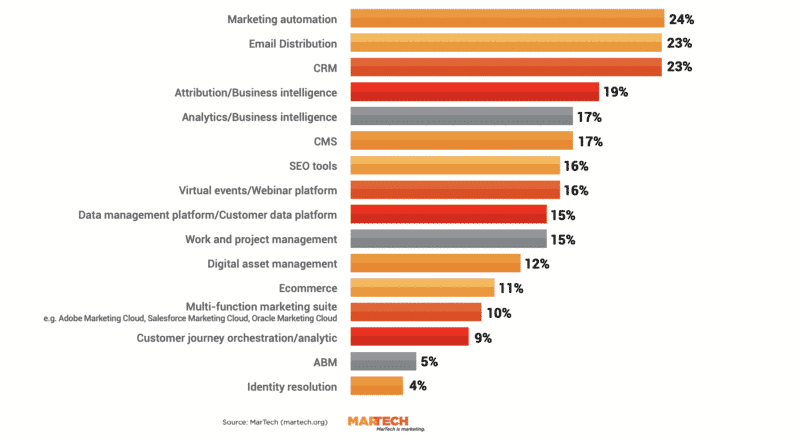Automation, email, CRM among major marketing tools replaced in the past year
Our data showed that marketing organizations replaced a large range of tools, some very central to marketing activities.
Last week we introduced you to this year’s MarTech Replacement Survey which, among other things, showed just how bullish marketing organizations were to make changes to their marketing technology stacks during the pandemic.
This week, we’re sharing some key data on specific platforms from the report.
The main objective of the survey was to find out the kinds of solutions replaced and the reasons marketers swapped them out. Our data showed that organizations replaced a large range of tools, some very central to marketing activities. Here is the breakdown:

Category analysis
Marketing Automation and Email. The most widely replaced solutions surely reflect the intensified need for digital engagement we’ve witnessed over the past year to 15 months. Marketing Automation (24%) and Email Distribution (23%) heads the list. CDPs/DMPs showed growth, but it wasn’t quite as strong (15%). The solutions listed in the 2019 survey were slightly different (the space, of course, changes fast), but marketing automation has topped the list two years running. In contrast, only 6% of respondents reported replacing email solutions in 2019, signaling the greater importance of email in pandemic times. Of course, for many businesses, marketing automation acts as their email solution.
CRM. The number three solution replaced was CRM (23%), which was surprising because while B2B businesses especially had good reasons to acquire a CRM in 2020, it’s not as clear why existing CRMs needed replacing. The most likely explanation relates to the increasingly digital nature of the B2B purchase journey and the need to execute data-driven engagement at the right touchpoints. The results suggest that a lot of the CRMs previously in place didn’t support that need. It’s also possible that the replaced CRMs were not playing well with execution solutions like Marketing Automation.
Virtual and remote. Predictably, there were upgrades for virtual event management (16%) and for those kinds of workflow tools that might not strictly be marketing-specific, but which help distributed marketing and marketing operations teams get their work done (15%). It will be interesting to see a year from now whether those solutions will still be valued; we’re guessing that in a hybrid real/digital world the answer is yes.
E-commerce and CMS. With so many B2B organizations compelled to offer digital support for the purchase journey, and even self-serve options in categories previously strongly driven by in-person contact with sales, we might have expected to see more focus on e-commerce solutions or the CMSs that support e-commerce and other digital content. 17% did replace their CMS, 11% their e-commerce solution. Digital asset management (12%) is also part of the content marketing stack. Because of the rapidly increased importance of content, this might be taken as an indication that organizations were largely happy with what they had.
Audience and intelligence. Other replacements hitting double figures were Attribution/Performance Tools at 19%; Analytics/Business Intelligence (17%); and SEO Tools (16%). With the pandemic leading to more digital focus, businesses with the budget focused on digital advertising. So it is not surprising that marketers replaced performance tools. SEO also became hugely important for companies as digital presence became the only storefront that mattered during the height of the pandemic. And with increased emphasis on digital activities, we suspect organizations sought more robust analytics platforms to monitor ROI. However, Customer Journey Orchestration/Analytics (9%) might have been expected to rank higher. That’s something that must play a greater role as channels continue to proliferate.
Fearless replacements. Given the investment in cost and time implicated in replacing a multi-function marketing suite like those offered by Adobe, Oracle and Salesforce, it is notable that almost 10% of respondents did replace one in the period covered by the survey. That indicates a heavy financial investment, possibly including implementation consultants, and a heavy investment of person-hours too.
Untouched? The least replaced solutions on our list related to ABM and Identity Resolution. Given the importance of ABM, especially to B2B marketers, that might reflect satisfaction with existing solutions, or possibly a lack of significantly differentiated alternatives for organizations not looking to upscale to an enterprise solution. Identity Resolution might not be viewed as a separate tool from a CDP or DMP.

This is MarTech.
This is our mission.
Replacement case: Going headless
Thomas Prommer, a marketing and technology consultant, acts as senior technology advisor for a $ 500-plus million retail company. This year, his client replaced a commercial CMS with a commercial headless model.
“We were moving toward a headless CMS, and away from enterprise closed-source walled gardens like Salesforce and Adobe and more toward a pure-play,” Prommer said.
With ongoing migrations, the organization prefers a modular set of tools vs. single-vendor ecosystems.
“The ecosystems will be best-of-breed for particular digital capabilities, including personalization and messaging,” said Prommer. “In this world, you don’t get all your services from one provider.”
Prommer said his organization seeks out the best-of-breed in each category, like personalization and messaging. He sees this trend toward modular ecosystems picking up steam in organizations that favor innovation, like retail and media, compared to industries like finance that tend to lag.
The post Automation, email, CRM among major marketing tools replaced in the past year appeared first on MarTech.
(31)



